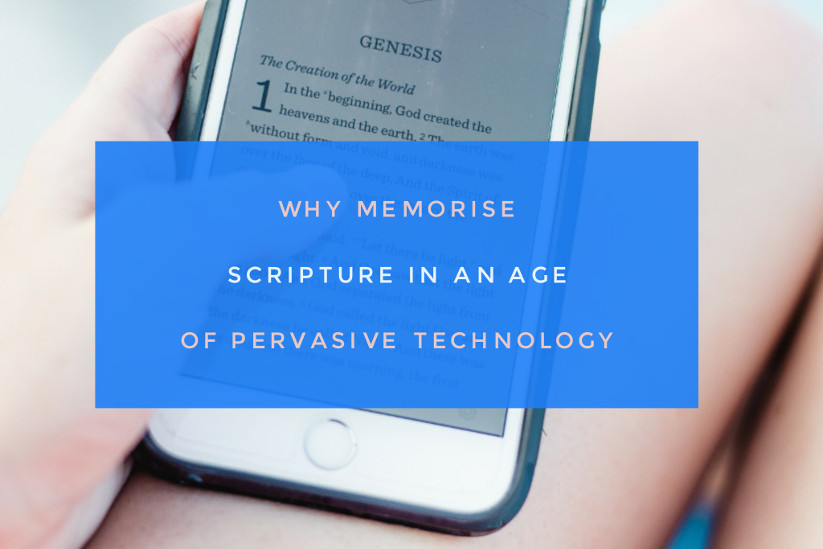Why Memorise Scripture In An Age Of Pervasive Technology?
We live in an age where mobile technology enables us to know almost anything that there is to be known in a matter of seconds.
In our pockets, we have a device that holds more information than all the great libraries of the past.
The same is no less true of our access to the bible. Within seconds I can be reading scripture in any number of translations and languages, as well as a multitude of commentaries and bible reading aids.
When I was younger people would extol me on the virtues of memorising scripture lest I be thrown into solitary confinement under a communist state and am stripped of my Bible – but the older I get the more and more unlikely this seems.
Therefore, with a bible ever at my fingertips, what could the purpose be of spending my time memorising scripture?
The Complexity of Neurology
When we think about the brain and memorisation we often think of it like a hard drive on a computer.When we memorise something it is like we are downloading a file into our brain; and when we recall it, it is like opening a file from our hard drive.
This, however, is very different in reality.
Memories are created by a series of neural connections. The more we memorise something (over a period of time), the stronger the connections become.
This goes further as connections also form around clusters of similar information (metaphorically). For example the more we know about the French language, the easier it is for us to learn French words. Or the more we know about philosophy the easier it is for us to understand a philosophical movement like existentialism. This is so because we have the necessary scaffolding or framework to incorporate these into our memories.
 We can liken these neural connections to a road. Whereby a road not used very often will be like a dirt track that is difficult for cars to get down. A road used frequently, by necessity, will become a highway; very large with much traffic on it.
We can liken these neural connections to a road. Whereby a road not used very often will be like a dirt track that is difficult for cars to get down. A road used frequently, by necessity, will become a highway; very large with much traffic on it.Or we can compare it to a stream. When little water flows, the gulley will be small and narrow. But a large volume of water will soon carve larger paths leading to a strong flowing river. The traffic and water correspond with the level of mental energy that we give to specific connections.
This is known as neuroplasticity.
The above is true of things that we are not even consciously trying to connect.
People often talk about “switching off” at night after a hard day and watching mindless TV. Of course, our mind does not actually switch off during this time and is constantly attempting to make sense of what it is seeing / hearing and incorporate it into its worldview.
Underlying all of this is the emotional aspects. Again, unlike a computer, we do not store objective information like facts but are storing all that our senses are telling us. Therefore there is an emotional component attached to all of this.
And this is to say nothing of the extreme complexity that takes place between our neurology and that immaterial aspect of self: our soul.
The Transformation of Our Thoughts
This is why I believe Paul, in Philippians 4 verse 8, calls us to think on such things as whatever is true, honourable, just, pure, lovely, admirable, excellent and praiseworthy. Because it is the things that we think on and allow to enter us that begin to define who we are.Hopefully, you are starting to see where I am going with this.
Memorisation is not just about downloading and retrieving information. Rather, it is about shaping who we are.
This is why Psalm 119 verse 111 states that “I have stored up your word in my heart, that I might not sin against you”.
Because it is a matter intimately connected to the heart, indeed the two are inseparable.
Scripture calls us forward. It points the way for us to become the people that we have always supposed to have been. It moves us on a path of Christ-likeness – that will extend beyond this life and into eternity.
And so whilst memorisation of scripture or even scripture alone can never be the sole part of any programme of reform, it forms a key part.
Therefore like my elders mentioned previously, I too would extol us to memorise scripture. To allow it to filter into the deeper parts of ourselves. To allow scripture to seep into the cracks and broken parts of who we are.
If you want to begin a journey of scripture memorisation but don't know where to start, then I have created a handy checklist of some of the key passages of scripture that you will want to memorise, as well as some key steps on how to memorise scripture. Click the link below, enter your email address, and I will email it through to you.






Comments
Post a Comment